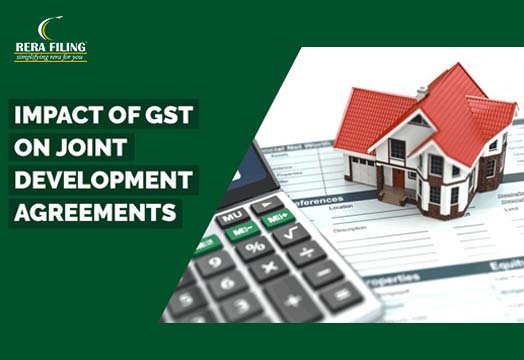GST on Joint Development Agreement (JDA)

- Friday 10th May 2019
- Author: Shreya Uppal
Highlights
when the Landowner receives a constructed property from the Developer in exchange for providing land, the Landowner would become liable for payment of GST.
A trend of multiple projects has been observed as Joint Development Agreements (JDA) carried out between the landowner and the developer.
By Section 15 of Central Goods and Services Tax Act, 2017 in case of calculation of the value of supply relating to JDA.
With the growth of real estate sector in India, more ways have been invented to ease the construction of the properties. One such way is known as JDA, Joint Development Agreement which allows the landowners and the developers to join hands and contribute to the development of the projects in their own way. A trend of multiple projects has been observed as Joint Development Agreements (JDA) carried out between the landowner and the developer. In a JDA the capital, construction and legal work are carried out by the builder whereas the land is provided by the landowner.
The two common types of JDA are described below:
1. Area sharing JDA
The landowner provides the land to the developer in return of which as a consideration the developer provides certain % of constructed area in the project to the landowner. The consideration is given entirely in kind.
2. Revenue sharing JDA
The landowner provides the land to the developer in return of which as a consideration the developer provides certain % of Sales Revenue of the project to the landowner. The consideration is given entirely in Cash.
Tax rate on a JDA
18% GST is applicable on the development right given by the land owner to the developer.
To understand the impact of GST on JDA, we shall consider three relevant points which one needs to know:
1. Type of transactions and its taxability
A. Landowner to Developer: Transfer of development rights by Land owner to developer. It attracts GST at the time of supply. It is a continuous supply of services. Development rights mean the right to construct and own the superstructure of the land.
B. Developer to Landowner: Developer provides construction service to Land owner over a period (Applicable in Area Sharing JDA).
C. Developer to End Customer: When an Under-Construction Property is sold, GST is chargeable thereon. This too is a continuous supply of services.
Meaning of Continuous Supply of Services:
As per Section 2(33), “continuous supply of services” means a supply of services which is provided, or agreed to be provided, continuously or on recurrent basis, under a contract, for a period exceeding three months with periodic payment obligations and includes supply of such services as the Government may notify.
2. Time of Supply in case of JDA
1. Area sharing: Time of Supply is the time when possession is transferred by entering into a conveyance deed or giving allotment letter or area is demarcated.
2. Revenue sharing: Time of supply is as the time when the invoice is raised or payment is made, whichever is earlier.
3. Value of Supply
The value of supply shall be determined using the Valuation of Supply Rules explained by Section 15 of Central Goods and Services Tax Act, 2017 in case of calculation of the value of supply relating to JDA. Valuation should be based upon the actual transaction value or cash consideration received.
Therefore, to conclude when a developer enters into a development agreement with a Landowner, GST would become payable by the Landowner when the developer transfers possession or the rights in the constructed complex, building or civil structure, to the Landowner by entering into a conveyance deed or allotment letter. Hence, when the Landowner receives a constructed property from the Developer in exchange for providing land, the Landowner would become liable for payment of GST. The GST rate applicable on such a transaction would be 18%.
More Articles
- Online Listing Tips for Real Estate Agents
- How to start a Real Estate business in India - a complete guide !
- Renting Vs Buying property - How will you decide?
- What you should do in Property Management services
- Home Loan Insurance
- How to choose your builder?
- How to ensure fire safety in your home!
- Tips To Keep In Mind While Taking A Home On Rent
- Importance of Home Security
- How to plan your property budget?
- Leased vs. Purchased vs. Co-Working Office Spaces
- Easy Tips to Build an Eco Friendly Home
- Sample Flat - A Trick by a Builder?
- How to have a Beautiful Guest Room? Impress your Guests with these Guest Room Ideas..
- Understanding MCLR and its Effects on Home Loans
- 5 simple ways to close a real estate deal
- Is it worth to buy property near an airport ?
- Home loan tax benefit
- How to be successful in business as an introvert
- Cost effective home decor ideas
- What to Be-Paying Guest or a Tenant??
- Complete guide to start your small business
- Sports township- New trend in India
- Online Listing Tips for Real Estate Agents
- Understanding Floor Area Ratio- FAR
- Town and Country Planning | Meaning and Importance
- Checklist of Important Property Documents- All You Need to Know
- Role of CREDAI in real estate
Copyright © 2026 RERA Filing. All rights reserved.

 Rera Act
Rera Act
 Maharashtra
Maharashtra
 Karnataka
Karnataka
 Telangana
Telangana
 Andhra Pradesh
Andhra Pradesh
 Delhi
Delhi
 Uttar Pradesh
Uttar Pradesh
 Haryana
Haryana
 Gujarat
Gujarat
 Bihar
Bihar